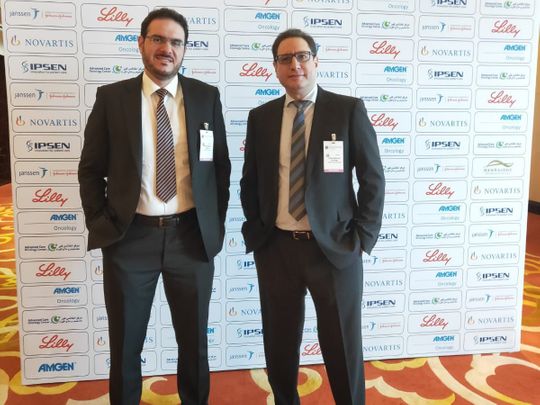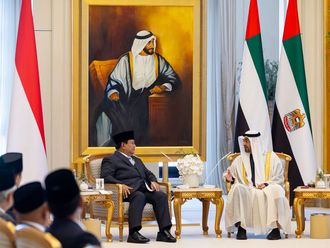
Dubai: The two-day Dubai International Oncology and Supportive Care Congress not only explored breakthrough evidence based on new protocols in cancer care, diagnostics and supportive services, but also established a new collaborative research society.
The hybrid conference held on Saturday and Sunday saw over 50 oncologists attend in person and several others attend virtually from around the world. The conference was chaired by Dr Abdul Rahman Agha Al Kinge, Head of the Oncology/Haemotology department at the NMC Royal Hospital, Dubai.
New treatment modes
The focus of the conference was to highlight cancer epidemiology, contemporary advancements in drug research, clinical trials on new medicines, treatment protocols, cancer vaccines, precision medicines, non-invasive surgeries, as well as new immunotherapies. There were many addresses also made on new diagnostic, radiation therapies as well as crucial supportive care for patients to improve their survival rates and quality of life.
Research programme
Talking about the new collaborative research project, Dr Abdul Rahman Labban, one of the keynote speakers and consultant haemotologist at Prime Hospital Dubai and Aster DM Healthcare/Medcare, told Gulf News: “Usually in the UAE, research in cancer is from a single institution. At this conference, we were successful in establishing a collaborative research body, which will have oncologists from various hospitals in the UAE; providing evidence-based data based on the case studies that they have in their hospitals. This is the most significant outcome of the conference as it will help us build a rich data base and provide depth for comparative study.”
Supportive care
In his keynote, Dr Labban spoke about importance of supportive care for cancer patients. “Cancer patients need a lot of support. My address talked about management of thrombolysis in specific cases, need for pain management, palliative care, radiation care, special diets and many other such supportive care that a cancer patient requires,” he told Gulf News.
Breakthrough insights
Several oncologists presented new insights into the analysis of new treatment protocols that are increasingly bringing better quality of life to cancer survivors. In his keynote on day one of the conference, Dr Mohannad Diab, Consultant Oncologist and head of the Department of oncology at the Burjeel Hospital, Abu Dhabi, spoke about the need of choosing patients for chemotherapy judiciously.
He told Gulf News: “As per new molecular genetics research of chemotherapy, not all patients require chemotherapy. Based on new genetics research patients can be now classified has having high risk, moderate and minimum risk of recurrence and not everyone is required go through chemotherapy. My focus was on the molecular sequencing of the Her2 medication, which was based on a paper presented by the international medical journal from NCCN. Earlier this sequencing was not established. However, now with the new sequencing outcome, all doctors can follow that clearly in Her2 medication with more effective results.”
New non-invasive therapies
Dr Nandan Shanbag, Consultant Radiation Oncologist at the Neurospinal Hospital, Dubai, made a presentation on day two on the array of new surgical and non-surgical techniques available for patients.
“My focus was oligo metastasis [multiple cancers sites in a single organ] or metastasis appearing in four or less organs. In such cases, earlier, doctors would give up on the patient. Let us say, a patient has five or less lesions in the brain, earlier it was inoperable. Now with new stereotactic radiation or targeted radiation such as with the cyber-knife, it is possible to treat such patients. Studies conducted on patients who have undergone such new therapies, indicate that these not only prolong the life of the patient but provide a better quality of life with minimal or no invasion,” he said.













